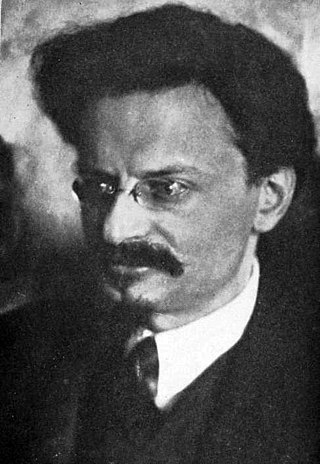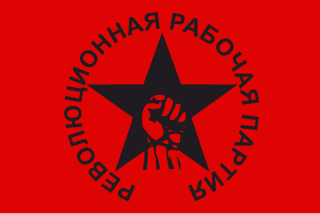Related Research Articles

Trotskyism is the political ideology and branch of Marxism developed by Russian revolutionary and intellectual Leon Trotsky along with some other members of the Left Opposition and the Fourth International. Trotsky described himself as an orthodox Marxist, a revolutionary Marxist, and a Bolshevik–Leninist as well as a follower of Karl Marx, Frederick Engels, Vladimir Lenin, Karl Liebknecht, and Rosa Luxemburg. His relations with Lenin have been a source of intense historical debate. However, on balance, scholarly opinion among a range of prominent historians and political scientists such as E.H. Carr, Isaac Deutscher, Moshe Lewin, Ronald Suny, Richard B. Day and W. Bruce Lincoln was that Lenin’s desired “heir” would have been a collective responsibility in which Trotsky was placed in "an important role and within which Stalin would be dramatically demoted ".

The Fourth International (FI) was a political international established in France in 1938 by Leon Trotsky and his supporters, having been expelled from the Soviet Union and the Communist International.
The League for Socialist Action (LSA) was the premier Trotskyist organization in Canada for much of the 20th century. Throughout its history the LSA went through many different names and iterations. In chronological order it was known as: the International Left Opposition (Trotskyist) of Canada, the Workers Party of Canada, the Socialist Policy Group, the Socialist Workers League, the Revolutionary Workers Party, The Club, the Socialist Education League, and the League for Socialist Action.

Ross Jewitt Dowson was a Canadian Trotskyist political figure and perennial candidate.

The Revolutionary Socialist League (RSL) was a Trotskyist group in the United States established in 1973 and disbanded in 1989.

Bolshevik–Leninist Party of India, Ceylon and Burma (BLPI) was a revolutionary Trotskyist party which campaigned for independence and socialism in South Asia. The party was formed in 1942 as a unification of two Indian groups, with the Lanka Sama Samaja Party of Ceylon. It was recognised as the Indian section of the Fourth International.
Revolutionary Workers Party−RWP, initially known as Revolutionary Samasamaja Party is a Trotskyist political party in Sri Lanka.
Jimmy Deane was a British Trotskyist who played a significant role in building the Revolutionary Socialist League. Along with Jock Haston and Ted Grant, he played a role during the Second World War in the Revolutionary Communist Party, the British section of the Fourth International.
Murray Dowson was a Canadian Trotskyist politician.
The Socialist Workers Party (SWP) was a Trotskyist political party in India.
The International Committee of the Fourth International (ICFI) is a public faction of the Fourth International founded in 1953. Today, two Trotskyist internationals claim to be the continuations of the ICFI; one with sections named Socialist Equality Party which publishes the World Socialist Web Site, and another linked to the Workers Revolutionary Party in the UK.

The Fourth International (FI), founded in 1938, is a Trotskyist international.
The third camp, also known as third camp socialism or third camp Trotskyism, is a branch of socialism that aims to oppose both capitalism and Stalinism by supporting the organised working class as a "third camp".
The Workers Revolutionary Party (WRP) is a Trotskyist group in Britain once led by Gerry Healy. In the mid-1980s, it split into several smaller groups, one of which retains possession of the name.

The Revolutionary Workers' Party is a Russian Trotskyist organisation established in 1999. From 2002 to 2011 there were two active organisations called the 'Revolutionary Workers' Party'. In April 2011, activists from one of the two, centred in Perm, merged their organisation into the Russian Socialist Movement. In May 2019 part of the RWP split and merged into the International Marxist Tendency, naming themselves Marxist Tendency.

James Patrick Cannon was an American Trotskyist and a leader of the Socialist Workers Party.
Revolutionary socialism is a political philosophy, doctrine, and tradition within socialism that stresses the idea that a social revolution is necessary to bring about structural changes in society. More specifically, it is the view that revolution is a necessary precondition for transitioning from a capitalist to a socialist mode of production. Revolution is not necessarily defined as a violent insurrection; it is defined as a seizure of political power by mass movements of the working class so that the state is directly controlled or abolished by the working class as opposed to the capitalist class and its interests.
The Revolutionary Communist Party was a British Trotskyist group, formed in 1944 and active until 1949, which published the newspaper Socialist Appeal and a theoretical journal, Workers International News. The party was the ancestor of the three main currents of British Trotskyism: Gerry Healy's Workers Revolutionary Party, Ted Grant's Militant and Tony Cliff's Socialist Workers Party.

The Socialist Workers Party (SWP) is a communist party in the United States. The SWP began as a group which, because it supported Leon Trotsky over Soviet leader Joseph Stalin, was expelled from the Communist Party USA. Since the 1930s, it has published The Militant as a weekly newspaper. It also maintains Pathfinder Press.
Michael Banda, born Michael Alexander Van Der Poorten, was a Sri Lankan communist activist best known as the General Secretary of the British Workers Revolutionary Party.